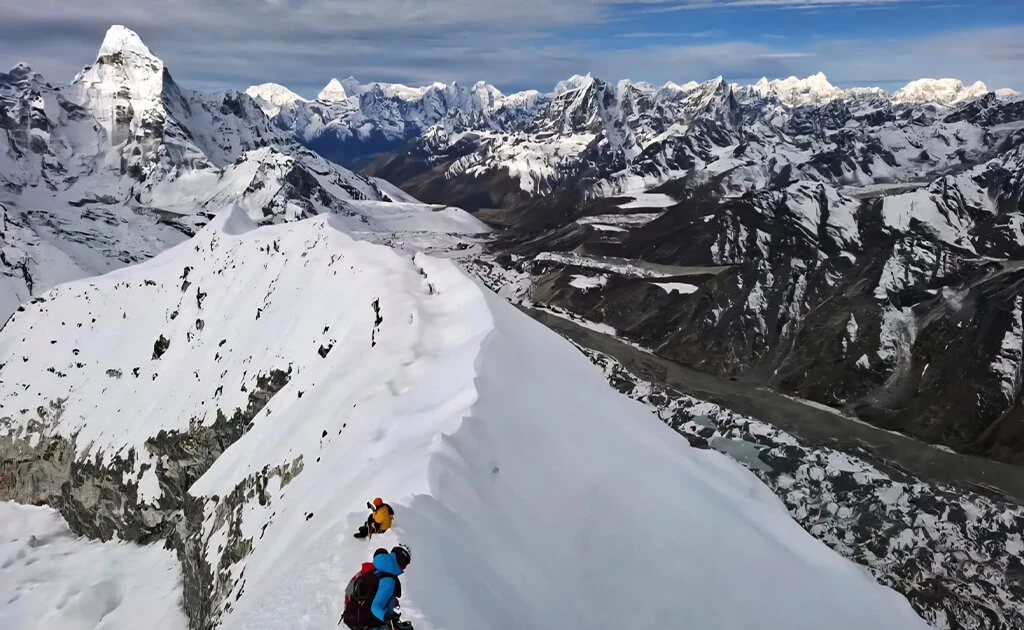Island Peak, located in the Everest region of Eastern Nepal, is one of the most stunning trekking and peak-climbing destinations in the Himalayas. Perfect for adventure enthusiasts, this 17-day journey takes you through surreal landscapes, culminating in the conquest of the magical Island Peak. Also known as Imja Tse, Island Peak stands at 6189 m (20,305 ft) above sea level in the picturesque Imja Valley, just a few miles from Mount Everest (8,848 m). The peak resembles an island amid icy waters, surrounded by towering silver mountains. Your adventure begins with a thrilling flight from Kathmandu to Lukla, one of the world’s most extreme and scenic airports. From there, the trek takes you through the beautiful trails of the Everest region, including Namche Bazaar—the gateway to Everest—and the historic Tengboche Monastery, immersing you in the region’s serene landscapes and vibrant culture. Along the way, you’ll also have the chance to visit Everest Base Camp, the starting point for many climbers’ dreams of summiting the world’s highest peak.
The climb to Island Peak starts from the base camp, progressing to High Camp for proper acclimatization before the final summit attempt. Experienced Sherpa guides will lead you through essential drills and provide guidance to ensure a safe and rewarding ascent. While the climb is moderate, it requires physical endurance, and the summit rewards your effort with breathtaking panoramic views of Lhotse (8,516 m), Mount Pumori (7,161 m), Mera Peak, Mount Barunste, and surrounding peaks. Island Peak can be climbed during the pre-monsoon (March–May) and post-monsoon (mid-September to November) seasons, with winter ascents possible for those prepared to face extreme cold. Our expert team ensures that your expedition is safe, enjoyable, and as seamless as possible, providing guidance and support throughout every step of your journey. This expedition offers a once-in-a-lifetime opportunity to explore the Khumbu region in depth while achieving the thrill of summiting a Himalayan peak.
Adventure, Altitude, and Unforgettable Views
Island Peak (6189 m) offers an exhilarating climb that blends high-altitude trekking with moderate technical challenges, perfect for adventurers seeking a Himalayan experience. Though easier than many other peaks in the Everest region, certain technical sections require basic knowledge of climbing gear, and beginners are strongly advised to climb with professional guides. Climbers should be aware of altitude sickness risks and unpredictable weather above 5000 m, making early summiting crucial. The ascent rewards trekkers with stunning panoramic views of the world’s highest peaks, immersive Sherpa cultural experiences, and an ideal opportunity to acclimatize for future expeditions. Required permits—including the NMA Permit, Sagarmatha National Park Entry Permit, and Khumbu Rural Municipality Local Permit—are included in most packages. The best climbing seasons are pre-monsoon (March–May) and post-monsoon (October to mid December). Physical preparation, proper acclimatization, and guidance from certified guides are essential for a safe and successful journey.
Best Option ( Island Peak with EBC)
Adding the Everest Base Camp (EBC) Trek before your Island Peak climb is one of the smartest choices for adventure seekers. Trekking to EBC and Kala Patthar gives you proper acclimatization, so your body is ready for the 6,189 m summit. Most of the trail up to Dingboche is shared, so adding a few extra days opens up new experiences without repeating effort. This combination offers excellent value for money, ensures safe acclimatization, and creates a once-in-a-lifetime adventure filled with breathtaking Himalayan views and rich Sherpa culture. For anyone seeking the ultimate Himalayan experience, combining EBC with Island Peak is truly one of the best choices.
